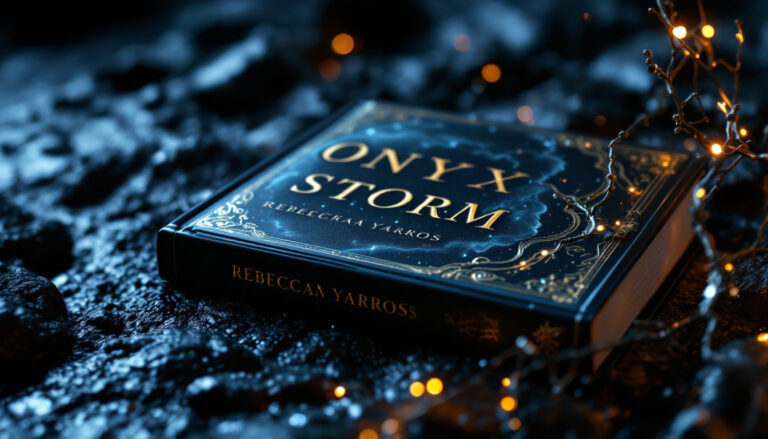Verity by Colleen Hoover – A Gripping Thriller Worth the Hype?
What happens when a struggling writer stumbles upon a chilling manuscript that could unravel everything? Verity by Colleen Hoover hooks readers with its mix of psychological suspense, romance, and morally complex characters. Loved by many for its shocking twists yet critiqued for its divisive storytelling, this novel has sparked endless debates. Whether you’re here to see if it lives up to the hype or wondering why it’s so polarizing, you’re in the right place.
Overview of Verity
Verity by Colleen Hoover is a psychological thriller that takes readers on a dark, suspenseful ride. The story intertwines romance, secrets, and chilling discoveries, keeping you questioning every character’s intentions. Let’s break it down with an in-depth look at the author, the key characters, and the mood that sets this book apart.
About the Author, Colleen Hoover
Colleen Hoover is a literary powerhouse, known for her ability to twist emotions into memorable stories. From self-publishing her debut novel “Slammed” in 2012, she quickly rose to become a #1 New York Times bestselling author. Her works cover a spectrum of genres, with popular books like It Ends with Us, Reminders of Him, and November 9. Hoover excels at blending romance with raw, emotional narratives that touch on life’s challenges. Her writing style is honest, concise, and immersive, pulling readers into her characters’ deepest struggles and conflicts. You can learn more about her and her body of work by visiting her official website.
Key Characters in Verity
In Verity, Colleen Hoover creates a vibrant yet unsettling cast of characters who drive the story forward with their interconnected secrets and questions of trust.
- Lowen Ashleigh: A struggling author hired to complete Verity Crawford’s book series after a tragic accident leaves Verity incapacitated. Lowen is quiet, introspective, and increasingly caught between her professional responsibilities and personal intrigue.
- Verity Crawford: The mysterious, bestselling author around whom the story revolves. Though bedridden and seemingly helpless, Verity’s discovered manuscript paints her in a disturbing and provocative light.
- Jeremy Crawford: Verity’s devoted husband who hires Lowen but harbors a dark past of his own. His role adds layers of complexity, as both his love life and his loyalty are put to the test.
These characters’ interactions brim with tension, manipulation, and moral ambiguity, making it hard to decide whose version of the truth to believe. For deeper insight into these characters, you can check out this character guide from SparkNotes.
Setting and Mood
The story’s main setting—a secluded and eerie mansion—plays a significant role in the book’s suspenseful atmosphere. Much of the novel unfolds in Verity’s family home, a place filled with shadows, secrets, and an unsettling stillness. This isolated environment mirrors Lowen’s growing paranoia, amplifying the psychological tension.
The tone alternates between seductive, dark, and horrifying, keeping readers on edge. The house becomes more than a backdrop; it transforms into a character in itself, harboring layers of untold stories. Want a closer look at how the setting elevates the mood? This review on My Book Joy captures the essence perfectly.
These elements combine to deliver an unforgettable experience that will leave readers questioning: what’s real, and what’s merely a crafted illusion by Colleen Hoover?
Strengths of Verity
Colleen Hoover’s Verity has captivated readers with its gripping narrative, making it a standout in the psychological thriller genre. Its appeal lies in the combined power of thought-provoking characters, a seamless pace, and engrossing storytelling. Let’s dive into the key strengths that have made this book a must-read.
Intriguing Narrative and Twists
One of the most talked-about aspects of Verity is its unpredictable storyline filled with twists that keep readers on edge. The narrative seamlessly shifts from Lowen’s perspective to excerpts from Verity’s manuscript, creating a dual-layered storytelling effect. This dynamic not only builds suspense but also challenges the reader’s ability to separate fact from fiction.
The book masterfully balances tension with moments of shocking revelations, ensuring that you’re left guessing until the very end. Just when you think you have it all figured out, Hoover pulls the rug out from under you. According to a review on Black & (Red)gister, the fusion of romance and psychological suspense is what truly sets the tone for this haunting tale.
Readability and Accessibility
One of the reasons Verity appeals to such a broad range of readers is due to Hoover’s straightforward writing style. Her prose is clean, unpretentious, and easy to follow, making the book accessible to both seasoned thriller lovers and casual readers alike.
Unlike overly dense novels in the same genre, Verity doesn’t bog down its audience with unnecessary complexity. Instead, it uses simple yet compelling language to paint a vivid picture of each scene. The result? A story that feels approachable without sacrificing depth. As highlighted in one Medium article, Hoover’s ability to connect with readers on an emotional level adds to the novel’s charm.
Page-Turning Element
If there’s one thing Verity does exceptionally well, it’s creating an unputdownable experience. Hoover uses pacing to her advantage by interspersing cliffhangers and rapid developments throughout the storyline. Each chapter ends on a note that compels you to immediately turn the page, eager to find out what happens next.
The alternating structure of Lowen’s life and Verity’s chilling manuscript keeps the tempo captivating. It’s a back-and-forth dynamic that mirrors a psychological chess match, with each reveal raising the stakes even higher. As noted by readers on Reddit, this pacing ensures you’re never left in a lull, making it an engaging read from start to finish.
Criticisms and Controversies
While Verity has gained a massive following and rave reviews, it’s not without its share of criticisms. The book’s unique style and content have sparked debates among readers, shedding light on areas where the novel has struggled to win everyone over. Let’s explore some of the major critiques that have surrounded Verity by Colleen Hoover.
Character Development Issues
One of the most common critiques of Verity is its character development. Many readers feel that the characters lack depth and consistency, making it challenging to connect with them on a personal level.
For instance, Lowen, the protagonist, is often described as being underdeveloped with unclear motivations. Her decisions sometimes feel more like plot devices than genuine reactions, leaving readers puzzled about her true intentions. Jeremy Crawford, Verity’s husband, has also been criticized for being one-dimensional, with what some describe as a “too-good-to-be-true” persona until darker elements emerge later in the novel. This disparity in character portrayal can make their interactions feel forced or unbelievable at times. A detailed reader discussion on Reddit highlights disappointment in how Hoover handled the characters’ complexities.
Additionally, Verity herself, while intriguing, can come across as exaggerated and inconsistent in her portrayal between the manuscript and her physical state. Some argue that these inconsistencies detract from the story’s psychological depth, a crucial element in thrillers. A review on The Sophian points out how certain character dynamics feel “predictable and out of character,” undermining the novel’s potential.
Plot and Pacing Concerns
Another recurring criticism revolves around the book’s plot and pacing. Some fans of the genre argue that certain twists are implausible, while others feel the pacing swings too dramatically between slow burns and rushed revelations.
The plot alternates between Lowen’s experiences and Verity’s disturbing manuscript, which adds intrigue but sometimes feels disjointed. There’s a sense that the story leans heavily on shock value rather than being anchored by a coherent narrative. For example, key plot points involving Jeremy’s behavior or Verity’s backstory are either underexplored or glossed over, leaving noticeable gaps. Readers on The Colgate Maroon News mention the disconnect, calling it “unrealistic and hyperbolic” at times.
Moreover, the story builds suspense effectively, but the payoffs don’t always satisfy. Some felt the transitions between the manuscript’s revelations and Lowen’s discoveries lacked seamlessness, creating a jarring experience. These plot inconsistencies have left readers divided, with some dismissing parts of the story as sensational rather than meaningful.
Explicit Content
The mature themes in Verity have drawn sharp opinions, particularly concerning the novel’s explicit content. Hoover doesn’t shy away from graphic depictions in both the romantic and psychological aspects of the story. While some readers find this boldness adds depth and realism, others argue it detracts from the primary narrative.
The book’s language and steamy scenes are described by critics as occasional overkill, overshadowing the suspenseful elements that fans expect from a psychological thriller. Some readers on The StoryGraph felt the explicit scenes were “gratuitous” and did little to advance the plot. In contrast, others viewed them as a natural extension of the characters’ relationships and flawed personalities.
Additionally, there’s debate over whether the inclusion of these themes serves a purpose in the story or if it’s primarily for shock value. Balanced perspectives, like those featured in reviews on Elizabeth Reads Books, underscore the intense reactions the content has elicited. For some, it adds intensity; for others, it feels unnecessary and distracting.
Despite these criticisms, it’s clear that the controversy surrounding these elements has fueled the book’s popularity, creating an ongoing conversation about what should—or shouldn’t—be present in thrillers like Verity.
Themes and Messages in Verity
Colleen Hoover’s Verity dives deep into the human psyche, exploring provocative themes and leaving readers questioning what they believe about morality, truth, and manipulation. Through a cast of imperfect characters and a tense narrative, the book challenges our perceptions of right and wrong, while unmasking darker sides of obsession and control. Here’s a closer look at two of the most remarkable themes that dominate the novel.
Exploring Obsession and Manipulation
Obsession and manipulation fuel some of the most intense moments in Verity. At its core, the novel intricately shows how these two forces shape relationships, decisions, and destinies.
Verity Crawford, one of the central characters, epitomizes obsession. Her devotion to her husband Jeremy transcends typical affection and veers into dangerous territory. Through her discovered manuscript, readers get a disturbing look at Verity’s determination to control every element of her marriage and motherhood. This is not love—it’s an unrelenting need for power cloaked in devotion.
On the other hand, manipulation isn’t confined to just one character. Lowen, the protagonist, begins her role as a seemingly innocent bystander but slowly becomes entwined in manipulation herself. As she uncovers secrets about Jeremy and Verity’s past, the lines blur between her professional role as a writer and her personal desires. Each calculated decision leads Lowen deeper into the Crawford family’s turmoil.
And then, there’s Jeremy. Throughout the novel, readers are left questioning whether he is being manipulated or is the manipulator himself. His subtle actions and ambiguous behavior consistently leave us wondering: what truth does Jeremy really hold? To explore how this dynamic shapes the characters and plot further, check out this analysis on SuperSummary.
These themes create a tangled web, making the novel an absorbing psychological battlefield. They also provoke a haunting question: who is truly in control when obsession and manipulation intertwine?
Moral Ambiguity
One of the most fascinating aspects of Verity is its unapologetic embrace of moral ambiguity. Rather than presenting clear heroes or villains, Colleen Hoover fills the story with morally complex characters that challenge the reader’s perspective.
- Lowen Ashleigh walks a fine line between victim and opportunist. Her initial hesitations about Jeremy and Verity transform into choices that are, at times, questionable. Does empathy excuse betrayal? This is a question readers have to grapple with as Lowen’s character unfolds.
- Verity Crawford is neither wholly evil nor completely misunderstood. Her manuscript is a damning piece of evidence against her, yet her outward vulnerability as a bedridden woman forces readers to second-guess themselves. Is she a victim of circumstance, or is she the mastermind of her own chaos? This article on SparkNotes dives deeper into Verity’s enigmatic role.
- Jeremy Crawford might appear as a grieving, devoted husband, but his actions are far from saintly. His choices raise important questions regarding loyalty, truth, and moral compromise. Could his actions be justified given the circumstances, or are they part of a more sinister agenda?
By refusing to give readers a clear moral compass, Hoover keeps the story compelling and builds tension to its breaking point. As you flip through the pages, you’ll find yourself switching allegiances repeatedly, second-guessing every conclusion. This theme adds a layer of depth to Verity, forcing readers to confront their own biases. A detailed breakdown of this subject can be found in this Medium article.
Much like life itself, the moral ambiguity of Verity leaves us with no easy answers—only questions. And maybe that’s exactly the point.
The Ending and Its Impact
The conclusion of Verity by Colleen Hoover is among the most polarizing aspects of the book. It twists the narrative yet again, leaving readers in a state of reflection, debate, and utter disbelief. With its ambiguous final revelations, Hoover ensures the story lingers in the minds of her audience long after the last page. Let’s unpack how the ending influences the overall impact and how readers have responded.
Plot Twists and Revelations
The ending introduces key twists that flip everything upside down. Readers are left reevaluating the trustworthiness of the story they’ve been following. Just when you think you’ve got a grasp on the characters and their motivations, Hoover pulls the rug out with a shocking revelation.
The most striking twist is the discovery of Verity’s letter, which contradicts everything written in her disturbing manuscript. Was Verity truly the monster her writings painted her to be? Or did she cleverly fabricate a fictional diary, positioning herself as the villain to protect her family from others’ judgment? This duality stokes the fire of ambiguity, making readers question the truth of every event leading up to the book’s climax. For a closer breakdown, this Reddit thread dives into how this twist amplifies the book’s unsettling tone.
These last-minute revelations serve two purposes: they cement Verity as a psychological chess game and make it impossible for readers to ever view the characters the same way again. The line between victim and villain blurs, leaving lasting moral questions. Yet this divisive approach also invites interpretations that vary from one reader to the next—whether that’s refreshing or frustrating is up for debate.
Reader Reactions to the Conclusion
The open-ended nature of the finale has sparked passionate discussions within the reading community. Some consider the lack of resolution a bold move, while others think it’s frustratingly incomplete.
- Positive Reactions: Many applaud Hoover for her ability to keep the ending rooted in ambiguity, encouraging readers to draw their own conclusions. This creative choice adds replay value to the book; readers frequently revisit earlier sections to hunt for clues they may have missed. A Goodreads Q&A thread reflects how readers interpreted Verity’s letter in wildly different ways, fueling debates about whether it was all part of an elaborate manipulation.
- Negative Reactions: On the flip side, not every reader is on board with the unresolved questions. Some argue that a definitive conclusion would have offered greater closure, claiming the ambiguous ending feels like a cop-out. As this blog post suggests, the finale left readers torn between being thrilled by the twist or unsettled by its implications.
The beauty—and controversy—of Verity’s ending is its ability to make readers think and feel deeply, whether they loved or loathed it. In the end, it’s this divisiveness that has kept Verity in the spotlight, ensuring it remains a memorable, if not endlessly debated, entry in Colleen Hoover’s bibliography.
Is Verity Worth Reading?
Colleen Hoover’s Verity is one of those books that’s hard to ignore. Love it or hate it, readers can’t stop talking about its dark themes, shocking twists, and jaw-dropping moments. If you’re on the fence, here’s a breakdown of who might love this book and who might struggle with it.
Who Will Enjoy It?
Verity is a feast for fans of dark, suspenseful stories and fast-paced psychological thrillers. If any of these sound like you, this book might be a perfect fit:
- Thriller Enthusiasts: Love twists, turns, and a creeping sense of dread? The unpredictable reveals in Verity will keep you hooked. It’s often compared to books like Gone Girl and The Girl on the Train. Check out this list of books similar to Verity to give you an idea of its vibe.
- Quick-Read Seekers: Hoover’s straightforward writing style makes this book a breeze to get through, even if you’re not an avid reader. It’s the kind of book you can devour in a single sitting.
- Fans of Romantic Subplots: Besides the thrills, Verity includes a steamy romantic angle that resonates with lovers of suspenseful romance. If you enjoy a mix of dark mystery and emotional connection, Hoover strikes a balance here.
- Readers Who Love Debate: This book leaves room for interpretation, especially with its controversial ending. If you enjoy dissecting books with friends or jumping into online discussions like this Reddit thread on Verity, Verity is a great pick.
Who Might Not Like It?
On the flip side, Verity isn’t for everyone. Some readers might be turned off by its content and style. Here’s who might struggle:
- Fans of Literary Fiction: If you prefer richly detailed prose or deep, introspective character explorations, Verity might fall short. Critics like this reviewer felt the characters lacked depth and realism.
- Sensitive Readers: Verity doesn’t shy away from dark, graphic themes. It tackles disturbing topics that could be unsettling for some. If you’re sensitive to heavy content or explicit scenes, this book might not be a comfortable read.
- Readers Who Crave Closure: The ending of Verity is incredibly divisive. With its open-ended twist, some readers have found it frustratingly incomplete. If you prefer neatly tied-up conclusions, this book could leave you disappointed. Curious why the ending sparks debate? Goodreads reviews delve into why opinions are so split.
- Those Who Need Deep Connection with Characters: If strong, well-developed characters are your thing, you might feel let down here. Verity, Lowen, and Jeremy intrigue but don’t always come across as fully fleshed out. This is echoed in reader comments like those in The Colgate Maroon News review.
Ultimately, Verity is a polarizing book. Whether it becomes your next favorite or leaves you questioning the hype depends on your reading preferences.
Conclusion
Verity by Colleen Hoover challenges readers with its haunting narrative, morally murky characters, and an ending that lingers long after the final page. While some praise its fast-paced storytelling and suspenseful twists, others critique the plot’s plausibility and character depth. Regardless, one thing is undeniable—Verity sparks discussions and leaves readers questioning their own perceptions of truth and manipulation.
If you’re ready for a book that keeps you guessing and guarantees heated debates, Verity might be your next unforgettable, if polarizing, read. What’s your take—team manuscript or team letter? Let us know!







